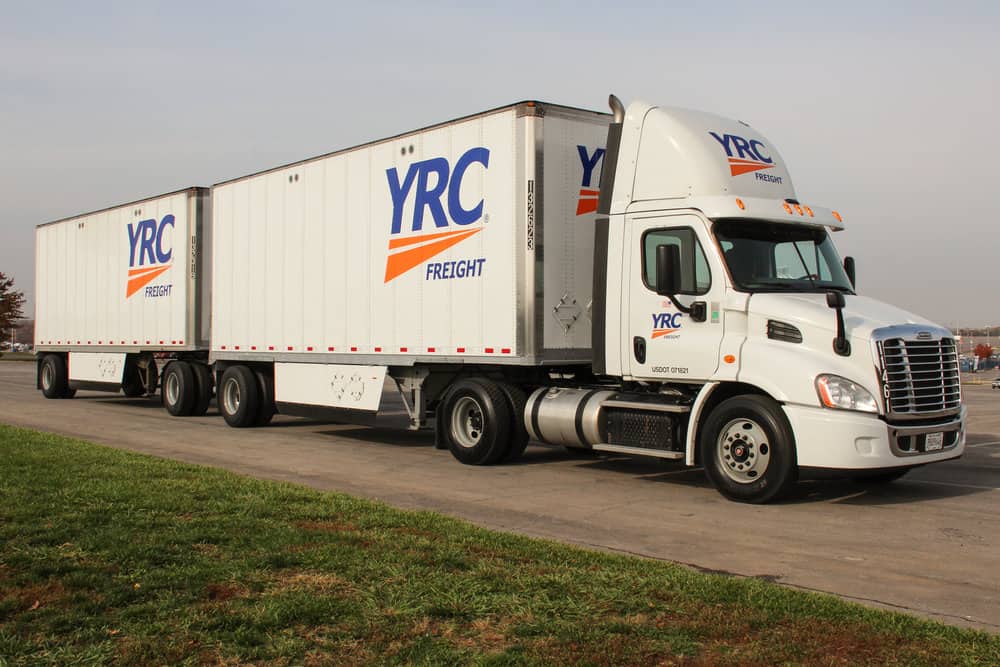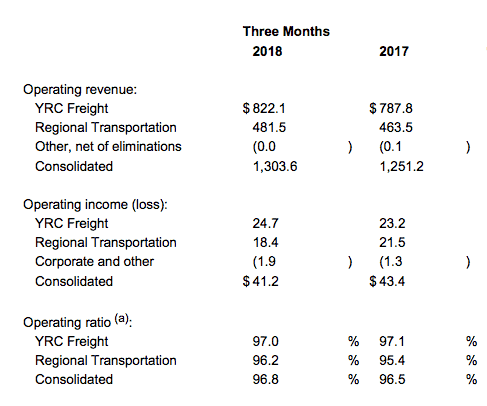
Less-than-truckload carrier plans to rejuvenate fleet and remain focused on price over volume.
YRC Worldwide (Nasdaq: YRCW) missed Wall Street analyst expectations for the third quarter as its regional carrier business underperformed. Chief executive Darren Hawkins says the driver shortage forced the less-than-truckload carrier to turn away customers during the quarter.
The Overland, Kansas-based YRC saw revenue grow year-on-year 4% to $1.3 billion, while net income stayed flat at $2.9 million for the quarter. Operating ratio for the company rose 30 basis points to 96.8% for the quarter.
But operating expenses rose at a slightly faster pace. Hawkins says the company saw a “single significant third-party claim and higher than expected vehicle maintenance, which we addressed with the on-boarding of new equipment.”
The claim added $5 million in expenses during the quarter while maintenance costs rose $2 million.
While operating income in its national YRC Freight business was up 6.5% to $24.7 million for the year, the Regional Transportation segment saw a 14.4% decline to $18.4 million.

YRC’s largest regional carrier, USF Holland, was forced to turn down freight due to the lack of driver capacity, Hawkins says, which it plans to address through stepped-up recruiting efforts.
The regional business also saw higher maintenance costs during the quarter due to the company’s older truck fleet.
“Our largest regional carrier with a footprint in one of the most competitive driver hiring markets in North America was forced to turn away profitable business due to capacity constraints, which, along with fleet maintenance, negatively impacted overall Regional segment.”
YRC has been renewing its fleet, bringing on 1,000 new tractors since the beginning of the year, with most of those going into the YRC Freight network. Upcoming deliveries of another 300 tractors in the fourth quarter will be going to regional fleets.
Hawkins says the company has renewed about 30% of its overall fleet of 14,000 tractors since 2015.
“Our fleet is older than we’d like and we’re on a dedicated mission of changing that,” Hawkins said.
Total tonnage per day was down 4% and 5% at YRC Freight and Regional, respectively, during the quarter. Yield rose with revenue per hundredweight up 4.8% to $22.85 excluding fuel surcharge at YRC Freight and up 6.3% to $11.19 at the Regional business.
The company was able to push through contract price increases of 7.4% through the quarter.
Through October, overall tonnage per day is down 7% at YRC Freight and 6% at Regional. Hawkins says the decline in volume partially stems from use of dimensioners to improve yield and turn down freight that is not profitable.
He say the company also saw a decline in truckload freight volumes, the first this year. But Hawkins says the decline stems from emphasizing price over volume.
“The LTL side of the business still feels firm,” he said.
When asked about the potential for a strike by UPS’s LTL drivers, Hawkins says the company may be able to pick up some incremental business, but the impact was not yet clear.
YRC faces its own labor negotiations as its current driver contract expires next March.










